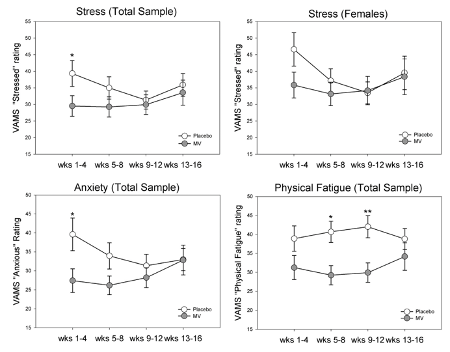Daily multivitamin (MV) supplementation has become popular among the general public, and previous studies have suggested that MV supplementation may have beneficial effects on mood and general health. There are a number of mechanisms of action by which MV may improve mood and well-being. First, B vitamins, including pyridoxine (B6), folic acid (B9), and cobalamin (B12), play an important role in the maintenance of brain health by facilitating neurotransmitter synthesis as well as the conversion of homocysteine (HCy) back to methionine. The importance of adequate vitamin D levels in preventing depression and seasonal affective disorder (SAD) has also been well documented. In addition, minerals present in MV (i.e., zinc, magnesium, calcium, and selenium) also play an important role in the maintenance of a healthy mood through their influence on neurotransmitter systems.
In a study, researchers provided a MV supplement containing high levels of B-vitamins to 138 eligible, healthy young participants (78 women and 60 men) between the ages of 20 and 50 recruited from the community on a daily basis for 16 weeks. Chronic mood measures (GHQ-28, POMS, Chalder fatigue, PILL, Bond-Lader, and a custom visual analog scale (VAS)) were administered pre-dose at baseline, 8-, and 16-weeks. Changes in Bond-Lader and VAS in response to a multi-tasking framework were also assessed at 8-, and 16-weeks.
The results found that for a subset of participants, at-home mobile-phone assessments of mood were assessed on a weekly basis using Bond-Lader and VAS. No significant treatment effects were found for any chronic laboratory mood measures. In response to the multi-tasking framework, a significant treatment x time interaction was found for the state-anxiety scale, with a trend toward greater increases in stress scores for male participants in the MV group at 16 weeks. However, this finding may be attributable to the larger proportion of students in the male MV group. In contrast, at-home mobile-phone assessments, where assessments were conducted post-dose, revealed significantly reduced stress, physical fatigue, and anxiety in the MV group in comparison to the placebo group across a number of time points (as shown below).

Note: Displaying aggregated data for weeks 1–4, weeks 5–8, weeks 9–12 and weeks 13–16. *Significant at the p<.05 level, **Significant at the p<.01 level.
Pipingas, A., Camfield, D. A., Stough, C., Cox, K. H. M., Fogg, E., Tiplady, B., … & Scholey, A. B. (2013). The effects of multivitamin supplementation on mood and general well-being in healthy young adults. A laboratory and at-home mobile phone assessment. Appetite, 69, 123-136. [Link]
